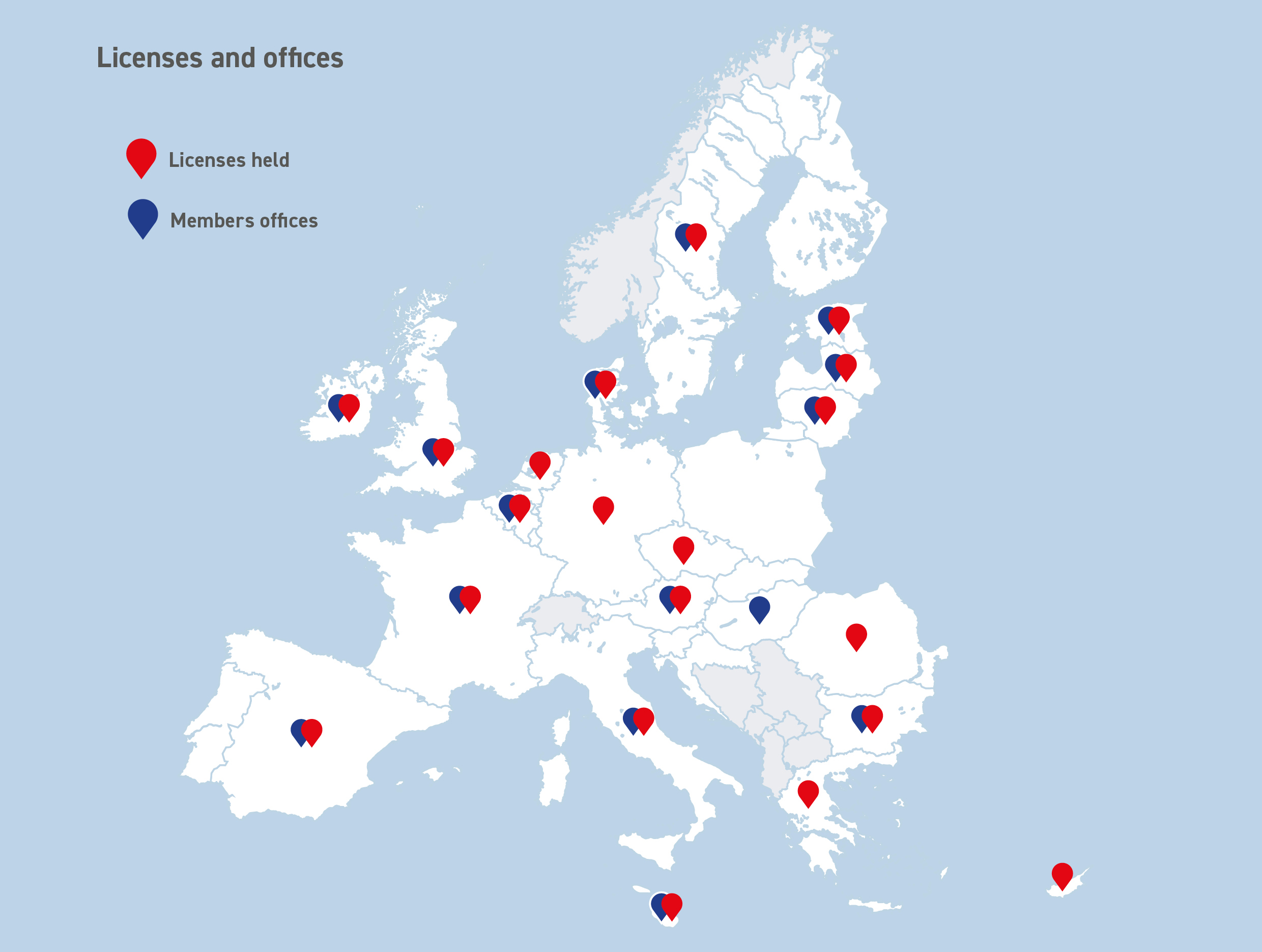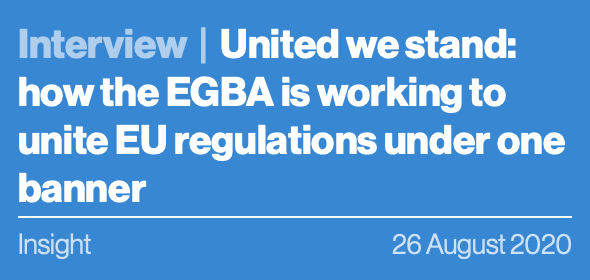United we stand: how the EGBA is working to unite EU regulations under one banner
26.08.2020
In the first of a two-part Q&A, EGR Compliance chats to the head of the European Gaming and Betting Association, Maarten Haijer, about the challenges of supranational gambling legislation and how the pan-European trade body is working to level the playing field for EU operators.
Robert Simmons, 26 August 2020 ![]()
![]()
International operators with a diverse operational footprint have always faced the problem of adapting to specific rules within a given jurisdiction, even though its nearest neighbour could have wildly different regulatory standards. This challenge can result in the allocation of significant compliance resources and can become a very costly process.
But what if instead of 27 different regulatory rulebooks, you only had one? That is the ultimate goal of pan- European trade body the European Gaming and Betting Association, which lobbies for the harmonisation of European regulatory standards and their unification under one piece of legislation.
However, as EGBA secretary general Maarten Haijer explains to EGR Compliance, getting 27 down to one isn’t as easy as it sounds.
Maarten Haijer

EGR Compliance: What would you define as the core mission statement of the EGBA?
Maarten Haijer (MH): There are a few elements but first and foremost, obviously we represent the interests of our members. We have five large operators that have multi-licences in the EU and UK. These are bet365, Betsson, GVC, Kindred and William Hill. And we cater for their interests. Our work focuses mainly on relevant EU policy and regulations but it has evolved, so a lot of the work that we do now is around regulations in various countries and educating about the online gambling sector policymakers, regulators and a wider audience. Last, but not least, is industry leadership; we think the industry needs to take more responsibility for its actions. There’s a lot of pressure now on the industry Europe-wide, in the UK, and other places like Italy, and we think that in the EGBA membership and industry as a whole we need to show much more leadership in areas that have to do with a sustainable sector and place in society.
EGR Compliance: Can you explain a little bit more about the makeup of the EGBA and its day-to-day activities?
MH: We have an office in Brussels; we’re five people working on content and we work in very close coordination with our members. So, we have daily contact with different people within the operator members of the EGBA. Mostly we are organising and coordinating working groups. For instance, we have a legal and regulatory committee which meets regularly where we speak with the regulatory and legal colleagues of EGBA member companies. We discuss all things relevant in terms of EU regulation, but also in terms of developments in national regulation that are of importance to our members and where EGBA can play a role to support them.
So, we have short direct lines. In addition to these working groups, we have a Board that consists of three members: bet365, GVC and Kindred. They set the overall strategic objectives of the association. Our members between them have over 120 licences across 20 different European jurisdictions. So, I think that’s one specific topic that we focus on – how we can make their life easier even though they need to fulfil so many national compliance requirements. Our work consists more or less 33% on national legislation and a third on European legislation. The final third is on leadership initiatives like the code of conducts on advertising and GDPR which we recently published.
EGR Compliance: How does the decision-making process work regarding what you’re going to lobby on? Is it a case of your board members giving you directives as to what to pursue?
MH: It is very much on a case-by-case basis, and as we are a membership-driven organisation we always look for consensus within our membership on topics that they want us to lobby on. We usually find a consensus about things that the EGBA should get involved in. We have limited time and resources like everyone, so we need to be selective. Ultimately, indeed, it’s up to the Board. The Board will take decisions if need be, but it is mostly based on a consensus. So, there is always a question, where do we focus and what are our priorities? We never actually have real conflicts on these areas and always find it quite easy to find agreement.
EGR Compliance: How have your operations been changed by the Covid-19 pandemic?
MH: We’re a lobbying organisation first and foremost and that consists of speaking to people in addition to submitting documents and position papers to various bodies. However, a lot of things we do is education, which is easier on a one-on-one basis through physical meetings, rather than sending around long policy documents. Like everyone else, we’re not travelling and we’re not having physical meetings at the moment, so that part has become more difficult. Having said that, like many other organisations we have substantially increased our online outreach. And obviously for other parties like regulatory stakeholders, they are in the same position. For the time being, it has been doable, but nothing really beats meeting people in person. So, we’re looking forward to hopefully, after the summer, returning to some sort of possibility to meet people in person again.
It makes a big difference when I try to explain to people how the online gambling market works. I really look for whether people are not understanding me or their body language, whether they nod, for example. Even with a camera on, it’s more difficult to see them and judge this than when you’re in person.
The EGBA’s membership and offices are spread across the EU
EGR Compliance: The EGBA has developed a code of conduct for gambling advertising, together with codes relating to data protection and GDPR over the last 12 months. What are you working on now in terms of best practice documentation?
MH: These two codes that we worked on, more or less in parallel, have been under development for maybe even two years rather than one year. They’re ready but I think that’s only half the work. Very clearly, if you produce a code of conduct and you issue a press release, that doesn’t cut it on its own. It’s been very clear from discussions that we had also with regulators, with other stakeholders and the European Commission, that the monitoring and enforcement of the code of conducts is an important part.
We’re now actually doing a lot of explaining, promoting it and we’re implementing it. Then the monitoring part is the other thing. There’s a slight difference between the advertising code of conduct and the GDPR code of conduct. The advertising code is done and ready and our members are already complying with it. We’re now putting in place a monitoring body that is going to track whether the advertising of the signatory companies is complying with our code. For GDPR it’s a slightly different and more formal approval process. Our GDPR code has been submitted to European data protection authorities and they are now actually going to look at it, analyse it and see whether they think it complies with GDPR itself. That process can take 12 to 18 months and we might need to change our code in response to their comments to make sure it aligns with their feedback. And once that has been done, we have a finalised code and we’re going to have monitoring of this as well. But that’s all described in part of the GDPR itself as a very prescriptive, laborious process.
We encourage other associations to sign up to both codes. The industry needs to step up and take responsibility. And these codes provide basic but essential standards which operators should apply. We are speaking with different operators that are not EGBA members but do want to sign up. For the advertising code of conduct, we were speaking to a few that had shown interest but once we explained that monitoring and the cost of monitoring would be part of the package, we didn’t hear back from those operators again. So that was pretty disappointing. I think it definitely shows that companies need to really follow up and take responsibility seriously. It shows you that we as an industry have a long, long way to go before we can expect the outside world to take us as a responsible, sustainable industry. Too many companies still see having standards as a simple business cost, rather than an essential requirement for a responsible industry which has a sustainable future.
How do we show the outside world that we do care about society and we’re not just there to make a quick buck, put a lot of ads out on TV and not be responsive to concerns in society?
EGR Compliance: The monitoring regime sounds interesting. Could you provide more information on the timetable for that to be set up and what it will look for?
MH: With the GDPR code of conduct, the code needs to be monitored as per the terms of the GDPR, but the monitoring body needs to be approved by these data protection authorities, and they haven’t done so yet for any other code because EGBA’s code is actually one of the first European sectoral codes of conduct in the context of GDPR. There’s no official monitoring body yet but we’re speaking to one and that will be 12 or 18 months down the line.
On the advertising code, we are speaking with EASA, the European Advertising Standards Alliance body, which is the umbrella body representing advertising regulators across Europe. In the UK their member association is the Advertising Standards Authority. The ASA is responsible for the advertising rules in the UK – but they have sister organisations everywhere else in Europe as well and these organisations are part of EASA. We are looking for EASA to implement the monitoring of our code. EASA also carried out a gap analysis comparing our code with the regulations on advertising in 15 European countries. So, we already have a good overview of how our code compares to the existing rules in 15 member states. EASA also actually monitors other codes of conduct in other industries. The alcohol and food codes are interesting ones and it has been being very helpful to learn from them.
EASA will look at advertising in specific countries and specific channels. Once a non-compliant ad is detected, that will be reported immediately. Once a non-compliant ad has been flagged and reported to the operator that is enough in terms of enforcement. So, the monitoring and transparency is efficient based on the experiences they have with the food and alcohol industry. It is efficient for companies to change whatever needs to be changed. At this stage, we do not have any additional enforcement measures other than the transparency tool because transparency is sufficient as no company wants to be seen not to be compliant for obvious reasons such as damage to reputation. There’s proof that this transparency tool is sufficient to make companies, in this case and food and alcohol companies, comply with their industry code.
EGR Compliance: Will individuals be able to report gambling ads?
MH: Absolutely. As part of the gap analysis that we received from EASA is the number and types of advertising complaints received from individuals. Individuals can continue to complain to national authorities about ads and, also, if they feel that an ad does not comply with the EGBA code of conduct on advertising, they can report that as well. So, there is scope for spontaneous reporting of adverts but also the structured monitoring of the EGBA code being conducted across Europe.
EGR Compliance: The EGBA is very active in terms of voicing its concerns about legislation, and it argued against regulatory changes in several key jurisdictions including Germany, Denmark, Sweden and the Netherlands over the last year. Why is it so important to you to maintain that active voice by weighing in on changes to regulation?
MH: Our members are gambling operators and we are here to represent their interests. In some of these member states there is also a national association with whom we cooperate quite closely. We also bring specific expertise to the table with consultations or discussions about regulation. Secondly, we have a quite a lot of industry data that we use in our outreach to these countries. We noticed that national regulators, authorities or legislators are very sensitive to what we say from a European point of view. They are mindful that our members are large operators so what we say is relevant and has authority. We noticed that they are very much open to our input.
It works both ways because once regulation is in place or in the final phase of discussions, we do notice that national authorities also like to have a national representation that they can talk to. But in that sense, we complement each other. We have close links with almost all national associations in Europe. I think the regulator is also very keen to hear what’s happening in other jurisdictions as well. We organise a yearly meeting for national regulators and we always have a good number participate, up to 15 authorities normally. National regulators attend because they want to learn about and be able to speak on European affairs and Europe-wide issues facing the market and regulators, or to even view the data and reports that we present for them.
EGR Compliance: What are your objectives for the coming year?
MH: Clearly sustainability, and with all the political and regulatory pressures that’s building up in jurisdictions that used to be quite market-friendly jurisdictions it is becoming much more critical. The big question is why is this happening and what do we need to change as an industry to be part of the discussion rather than just a subject of it? Clearly sustainability, education and leadership will be big issues. How do we show the outside world that we do care about society and we’re not just there to make a quick buck, put a lot of ads out on TV and not be responsive to concerns in society? We need to really step up as an industry and inside EGBA as well. So, having said that, it’s up to the Board to decide. We have a longer-term strategy that we’re working on at the moment that should be ready by November and that will be the base of our work for the coming two to three years. Certainly, one of the priorities for EGBA will be to continue pushing better industry standards and responsibility in the sector, and one such initiative that we have in the pipeline is on industry guidelines for AML and setting higher standards in AML compliance.
This interview article was published in EGR Compliance on 26 August 2020.

